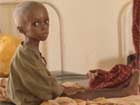| Videos | ? Latest |
|
? Feature | ? Sports | ? Your Videos |
UNICEF: malnourished Somali refugee children increase

 0 Comment(s)
0 Comment(s) Print
Print E-mail
Cina.org.cn, July 18, 2011
E-mail
Cina.org.cn, July 18, 2011
Among the hundreds of new arrivals waiting in queue outside the Dadaab refugee camps, are five-day old baby Isha, her five siblings and their parents. Because of their fragile conditions, the family is granted to bypass the long line, and receive registration right away.
A father Noor Miyo said: "My wife was 9 months pregnant when we made the journey. On the way we were stopped by militias and they took everything we had."
Nurto Manoor said: "I have gone through challenges, but I feel OK now. Thanks to the hospital where I received medical attention, my baby is fine. But I am worried about the future, maybe I won't have anything to give her."
The mother's worry is shared by many inside and outside the camps, which have grown to be one of the largest settlements in Kenya, next only to the capital Nairobi and port town Mombasa. Feeding programs like this have been overwhelmed with a sharp increase of malnourished children. Many of them were bought here too late and are in serious conditions.
Amina Ali is one of the camps recent arrivals. Over the past few years she has lost 6 out of her 10 children. Now she is worried that she may lose another one.
Pediatrician Abdikashur Mohamed said: "He has just arrived now in the ward and has had watery diarrhea at home. He seems to have developed severe dehydration. The child is already very sick and very weak. They just wait and until they see the child is dying and they rush."
UNICEF Nutrition Specialist Olivia Agutu said: "The women here need to be counseled. Most of them are new arrivals and might not be knowing how to take care of their children and how to manage these children when they go back home. So a lot of counseling needs to be done."
Like nutrition, children's education needs are also immense. These children have to take their classes in the open, because the proper schools are too crowded to accommodate them. Same for the child-friendly spaces, more are needed so that more children can enjoy moments like this, when they can forget about the harsh realities of life in the camps, but play, sing and dance happily.





